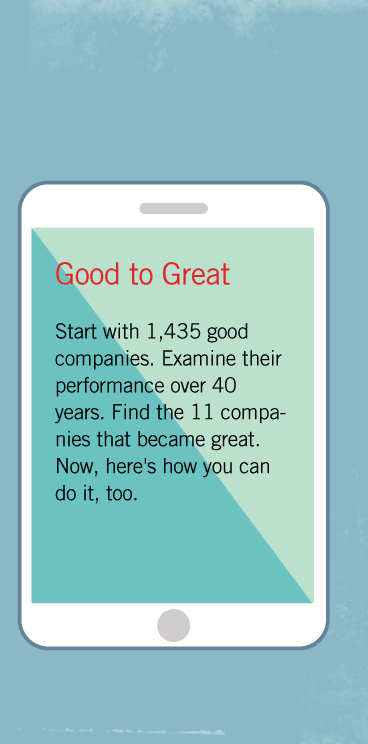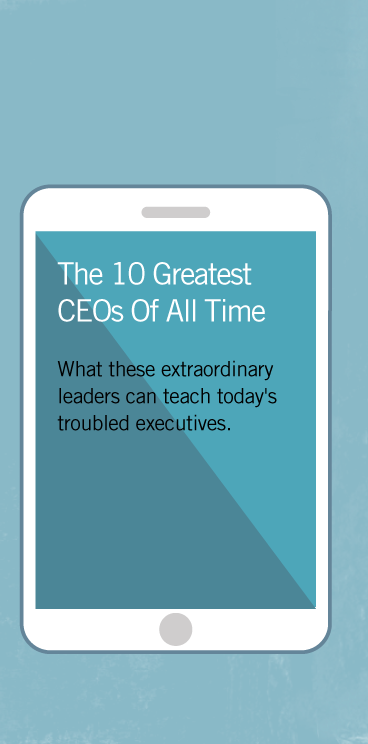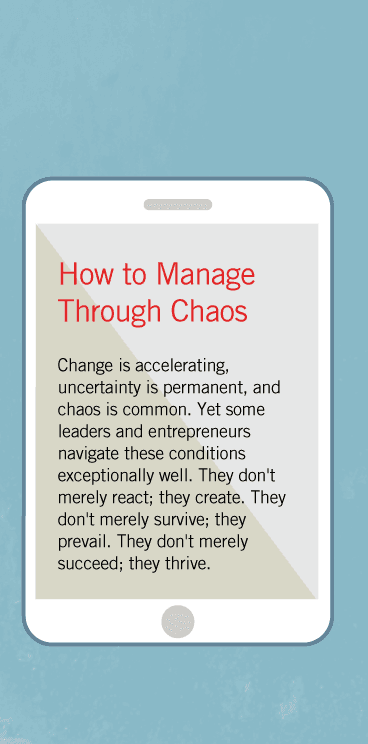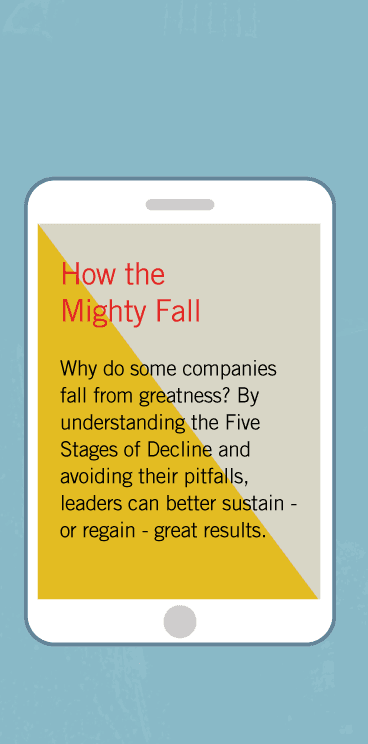Book Value
Inc.
January 1996
Executives should read fewer management books. I don't mean that
reading is a waste of their time; on the contrary, they should
read more. The question is what to read. My own view is that only
one book in 20 should be a business book.
That may sound odd coming from an author of three management books, but I'm convinced that you can improve your leadership capabilities by drinking deeply from the well of great books that have been published in a wide variety of disciplines. For one thing, the business and management genres offer precious few superb books with new insights, good writing, and timeless value. I can think of fewer than 10 published in the last 50 years.
More important, outstanding leaders and thinkers often get their best insights by reading outside their primary field. Abraham Lincoln, for example, forged his thinking on the slavery question by reading Euclid's ancient treatise on geometry and then applying the concept of logical proof to the great issue of the day. Charles Darwin read about Adam Smith's economic concept of the "invisible hand" while struggling to formulate his biological concept of natural selection (which, of course, became the invisible hand in the theory of evolution). Peter Drucker told me that the most influential author in his intellectual development was the Danish existentialist philosopher Soren Kierkegaard. The great entrepreneur Henry Ford avidly read essays by Ralph Waldo Emerson and applied Emerson's ideas to his company.
Here are a handful of my most highly recommended selections:
Chimpanzee Politics, by Frans de Waal. Even more enlightening than Machiavelli’s The Prince, this book describes power takeovers and social organizations in a chimpanzee colony and argues that power politics is part of the evolutionary heritage that we share with our closest nonhuman relatives. I’ll never look at academic or corporate politics the same way, and I understand their machinations much better for having read this book. Chimps, unlike humans, do not cloak their political pretenses in rhetoric, so we can see more clearly the process at work and thereby learn much about ourselves.
The Guns of August, by Barbara W. Tuchman. This book may well have saved the world from nuclear holocaust. During the 1962 Cuban missile crisis, President Kennedy drew directly upon the lessons of Tuchman’s book—which chronicles how, in August 1914, European nations locked themselves into irreversible political and military positions and thereby needlessly brought about the slaughter of World War I. In the midst of the missile crisis, Kennedy said, “I am not going to follow a course which will allow anyone to write a comparable book [about the missile crisis].” Superbly-written, this book teaches valuable lessons about how an organization can be led or driven into calamity through pride, arrogance, and misunderstandings.
Influence, by Robert B. Cialdini and The Psychology of Attitude Change and Social Influence, by Philip B. Zimbardo. I don’t see how anyone can hope to be an effective manager without having a basic understanding of social psychology—the forces of human influence and the dynamics of social behavior. These two classic works, both jam-packed with specific examples and fascinating research studies, teach invaluable managerial lessons. For example, revolutionary change can best be accomplished by “incremental revolutionaries,” who lead people from A to Z by taking small steps from A to B, then from B to C, then from C to D, and so on, so that the step from Y to Z hardly looks like a revolution at all. Another tidbit: explicitly assign people to play devil’s advocate—to “consider the opposite”—and thereby dilute the influence of groupthink that so often plays a role in disastrous decisions.
In Love and War, by Jim and Sybil Stockdale. As the highest-ranking POW in the Hanoi Hilton—in captivity and under physical and psychological torture for seven years—Jim Stockdale displayed iron-willed integrity under the most severe conditions. Stockdale teaches that freedom is a state of mind and that the two greatest weapons of enslavement are guilt and fear, not bars and walls. Stockdale drew strength from Job in the Bible, with its central lesson that if you persist in asking, "Why me?"—if you fail to accept that life is not fair—you cannot endure.
Means of Ascent, by Robert Caro, and Truman, by David McCullough. I love biographies. They offer us a chance to learn from the experiences of others and to develop role models and antimodels. Caro shows through the rise of LBJ how those consumed by ruthless, amoral ambition can become influential in democracy—a tale that's riveting, revealing, and depressing. McCullough, in contrast, inspires with the story of Harry Truman, a failed businessman with rock-solid midwestern core values, who rose to become one of the most important and effective presidents in U.S. history. Taken together, LBJ and Truman demonstrate that while a leader need not be morally grounded to become powerful, the judgment of history depends directly upon one’s own moral character.
The Panda’s Thumb, by Stephen Jay Gould. We cannot understand our complex world without grasping the basic elements of evolutionary theory. In fact, Jerry Porras and I dedicated an entire chapter of our book Built to Last to how visionary companies like 3M and Hewlett-Packard often “evolved” in a way that only in retrospect looks planned. All of Gould’s books on evolution and natural history are superb, but Panda’s Thumb is my favorite and is a good place to start.
The Plague, by Albert Camus. In this novel Camus wrestles with the question, How do we find meaning in a seemingly meaningless—and certainly brutal and alienating—world? His answer: we must create our own meaning by infusing our tasks with a sense of purpose and by seeking human connection. What does that have to do with management and leadership? Everything. The builders of great organizations appreciate people's deep yearning for meaning, and they instill a shared sense of purpose and create tightly knit cultures that bond people together. Sam Walton made discount retailing a meaningful pursuit, as David Packard did with technology, and Mary Kay Ash did with selling cosmetics.
The Second World War, by Winston S. Churchill. This 5,000-page, six-volume autobiography and chronicle of the years 1919 to 1945 is the best book on leadership I’ve read. Churchill’s eloquence comes to life as he describes day by day the monumental task of holding Britain and, later, the allies together against the Axis powers—a burden he shouldered at age 65 and carried until age 70. I learned from Churchill the inspirational power of reframing difficult times into a broader goal. When in 1940 the whole world wondered, “Can Britain survive?” Churchill countered that the goal was not to survive, but to prevail. Brilliant!
How to Listen to and Understand Great Music: The Greenberg Lectures, by Robert Greenberg, as part of the Superstar Teacher Series. I’m going to cheat a little here and include a purely audio “book.” The Superstar Teacher Series, produced by the Teaching Co., in Springfield, Va., assembles the best teaching professors to present courses on tape. The Greenberg music series combines a history of western civilization with a history of great music from ancient Greece to the 20th century. Greenberg’s 48 lectures come alive with passion and knowledge while they rock and roll with music from Mozart, Beethoven, Bach, Wagner, and others. The course illustrates the interplay between societal change and innovation, and offers a unique perspective on the acceleration of change wrought by the 20th century.
Someday perhaps I’ll write a column recommending the few business books of the past 50 years that are actually worth reading, but until then you might want to stick to reading a wide variety of nonbusiness selections. It will give you a better return on investment.
That may sound odd coming from an author of three management books, but I'm convinced that you can improve your leadership capabilities by drinking deeply from the well of great books that have been published in a wide variety of disciplines. For one thing, the business and management genres offer precious few superb books with new insights, good writing, and timeless value. I can think of fewer than 10 published in the last 50 years.
More important, outstanding leaders and thinkers often get their best insights by reading outside their primary field. Abraham Lincoln, for example, forged his thinking on the slavery question by reading Euclid's ancient treatise on geometry and then applying the concept of logical proof to the great issue of the day. Charles Darwin read about Adam Smith's economic concept of the "invisible hand" while struggling to formulate his biological concept of natural selection (which, of course, became the invisible hand in the theory of evolution). Peter Drucker told me that the most influential author in his intellectual development was the Danish existentialist philosopher Soren Kierkegaard. The great entrepreneur Henry Ford avidly read essays by Ralph Waldo Emerson and applied Emerson's ideas to his company.
Here are a handful of my most highly recommended selections:
Chimpanzee Politics, by Frans de Waal. Even more enlightening than Machiavelli’s The Prince, this book describes power takeovers and social organizations in a chimpanzee colony and argues that power politics is part of the evolutionary heritage that we share with our closest nonhuman relatives. I’ll never look at academic or corporate politics the same way, and I understand their machinations much better for having read this book. Chimps, unlike humans, do not cloak their political pretenses in rhetoric, so we can see more clearly the process at work and thereby learn much about ourselves.
The Guns of August, by Barbara W. Tuchman. This book may well have saved the world from nuclear holocaust. During the 1962 Cuban missile crisis, President Kennedy drew directly upon the lessons of Tuchman’s book—which chronicles how, in August 1914, European nations locked themselves into irreversible political and military positions and thereby needlessly brought about the slaughter of World War I. In the midst of the missile crisis, Kennedy said, “I am not going to follow a course which will allow anyone to write a comparable book [about the missile crisis].” Superbly-written, this book teaches valuable lessons about how an organization can be led or driven into calamity through pride, arrogance, and misunderstandings.
Influence, by Robert B. Cialdini and The Psychology of Attitude Change and Social Influence, by Philip B. Zimbardo. I don’t see how anyone can hope to be an effective manager without having a basic understanding of social psychology—the forces of human influence and the dynamics of social behavior. These two classic works, both jam-packed with specific examples and fascinating research studies, teach invaluable managerial lessons. For example, revolutionary change can best be accomplished by “incremental revolutionaries,” who lead people from A to Z by taking small steps from A to B, then from B to C, then from C to D, and so on, so that the step from Y to Z hardly looks like a revolution at all. Another tidbit: explicitly assign people to play devil’s advocate—to “consider the opposite”—and thereby dilute the influence of groupthink that so often plays a role in disastrous decisions.
In Love and War, by Jim and Sybil Stockdale. As the highest-ranking POW in the Hanoi Hilton—in captivity and under physical and psychological torture for seven years—Jim Stockdale displayed iron-willed integrity under the most severe conditions. Stockdale teaches that freedom is a state of mind and that the two greatest weapons of enslavement are guilt and fear, not bars and walls. Stockdale drew strength from Job in the Bible, with its central lesson that if you persist in asking, "Why me?"—if you fail to accept that life is not fair—you cannot endure.
Means of Ascent, by Robert Caro, and Truman, by David McCullough. I love biographies. They offer us a chance to learn from the experiences of others and to develop role models and antimodels. Caro shows through the rise of LBJ how those consumed by ruthless, amoral ambition can become influential in democracy—a tale that's riveting, revealing, and depressing. McCullough, in contrast, inspires with the story of Harry Truman, a failed businessman with rock-solid midwestern core values, who rose to become one of the most important and effective presidents in U.S. history. Taken together, LBJ and Truman demonstrate that while a leader need not be morally grounded to become powerful, the judgment of history depends directly upon one’s own moral character.
The Panda’s Thumb, by Stephen Jay Gould. We cannot understand our complex world without grasping the basic elements of evolutionary theory. In fact, Jerry Porras and I dedicated an entire chapter of our book Built to Last to how visionary companies like 3M and Hewlett-Packard often “evolved” in a way that only in retrospect looks planned. All of Gould’s books on evolution and natural history are superb, but Panda’s Thumb is my favorite and is a good place to start.
The Plague, by Albert Camus. In this novel Camus wrestles with the question, How do we find meaning in a seemingly meaningless—and certainly brutal and alienating—world? His answer: we must create our own meaning by infusing our tasks with a sense of purpose and by seeking human connection. What does that have to do with management and leadership? Everything. The builders of great organizations appreciate people's deep yearning for meaning, and they instill a shared sense of purpose and create tightly knit cultures that bond people together. Sam Walton made discount retailing a meaningful pursuit, as David Packard did with technology, and Mary Kay Ash did with selling cosmetics.
The Second World War, by Winston S. Churchill. This 5,000-page, six-volume autobiography and chronicle of the years 1919 to 1945 is the best book on leadership I’ve read. Churchill’s eloquence comes to life as he describes day by day the monumental task of holding Britain and, later, the allies together against the Axis powers—a burden he shouldered at age 65 and carried until age 70. I learned from Churchill the inspirational power of reframing difficult times into a broader goal. When in 1940 the whole world wondered, “Can Britain survive?” Churchill countered that the goal was not to survive, but to prevail. Brilliant!
How to Listen to and Understand Great Music: The Greenberg Lectures, by Robert Greenberg, as part of the Superstar Teacher Series. I’m going to cheat a little here and include a purely audio “book.” The Superstar Teacher Series, produced by the Teaching Co., in Springfield, Va., assembles the best teaching professors to present courses on tape. The Greenberg music series combines a history of western civilization with a history of great music from ancient Greece to the 20th century. Greenberg’s 48 lectures come alive with passion and knowledge while they rock and roll with music from Mozart, Beethoven, Bach, Wagner, and others. The course illustrates the interplay between societal change and innovation, and offers a unique perspective on the acceleration of change wrought by the 20th century.
Someday perhaps I’ll write a column recommending the few business books of the past 50 years that are actually worth reading, but until then you might want to stick to reading a wide variety of nonbusiness selections. It will give you a better return on investment.
Copyright © 1996 Jim Collins, All rights reserved.






